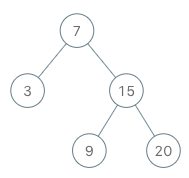实现一个二叉搜索树迭代器类BSTIterator ,表示一个按中序遍历二叉搜索树(BST)的迭代器:
BSTIterator(TreeNode root)初始化BSTIterator类的一个对象。BST 的根节点root会作为构造函数的一部分给出。指针应初始化为一个不存在于 BST 中的数字,且该数字小于 BST 中的任何元素。boolean hasNext()如果向指针右侧遍历存在数字,则返回true;否则返回false。int next()将指针向右移动,然后返回指针处的数字。
注意,指针初始化为一个不存在于 BST 中的数字,所以对 next() 的首次调用将返回 BST 中的最小元素。
你可以假设 next() 调用总是有效的,也就是说,当调用 next() 时,BST 的中序遍历中至少存在一个下一个数字。
示例:
输入 ["BSTIterator", "next", "next", "hasNext", "next", "hasNext", "next", "hasNext", "next", "hasNext"] [[[7, 3, 15, null, null, 9, 20]], [], [], [], [], [], [], [], [], []] 输出 [null, 3, 7, true, 9, true, 15, true, 20, false]解释 BSTIterator bSTIterator = new BSTIterator([7, 3, 15, null, null, 9, 20]); bSTIterator.next(); // 返回 3 bSTIterator.next(); // 返回 7 bSTIterator.hasNext(); // 返回 True bSTIterator.next(); // 返回 9 bSTIterator.hasNext(); // 返回 True bSTIterator.next(); // 返回 15 bSTIterator.hasNext(); // 返回 True bSTIterator.next(); // 返回 20 bSTIterator.hasNext(); // 返回 False
提示:
- 树中节点的数目在范围
[1, 105]内 0 <= Node.val <= 106- 最多调用
105次hasNext和next操作
进阶:
- 你可以设计一个满足下述条件的解决方案吗?
next()和hasNext()操作均摊时间复杂度为O(1),并使用O(h)内存。其中h是树的高度。
初始化数据时,递归中序遍历,将二叉搜索树每个结点的值保存在列表 vals 中。用 cur/next 指针记录外部即将遍历的位置,初始化为 0。
调用 next() 时,返回 vals[cur],同时 cur 指针自增。调用 hasNext() 时,判断 cur 指针是否已经达到 vals 个数,若是,说明已经遍历结束,返回 false,否则返回 true。
# Definition for a binary tree node.
# class TreeNode:
# def __init__(self, val=0, left=None, right=None):
# self.val = val
# self.left = left
# self.right = right
class BSTIterator:
def __init__(self, root: TreeNode):
def inorder(root):
if root is None:
return
inorder(root.left)
self.vals.append(root.val)
inorder(root.right)
self.cur = 0
self.vals = []
inorder(root)
def next(self) -> int:
res = self.vals[self.cur]
self.cur += 1
return res
def hasNext(self) -> bool:
return self.cur < len(self.vals)
# Your BSTIterator object will be instantiated and called as such:
# obj = BSTIterator(root)
# param_1 = obj.next()
# param_2 = obj.hasNext()/**
* Definition for a binary tree node.
* public class TreeNode {
* int val;
* TreeNode left;
* TreeNode right;
* TreeNode() {}
* TreeNode(int val) { this.val = val; }
* TreeNode(int val, TreeNode left, TreeNode right) {
* this.val = val;
* this.left = left;
* this.right = right;
* }
* }
*/
class BSTIterator {
private List<Integer> vals;
private int next;
public BSTIterator(TreeNode root) {
next = 0;
vals = new ArrayList<>();
inorder(root);
}
public int next() {
return vals.get(next++);
}
public boolean hasNext() {
return next < vals.size();
}
private void inorder(TreeNode root) {
if (root == null) {
return;
}
inorder(root.left);
vals.add(root.val);
inorder(root.right);
}
}
/**
* Your BSTIterator object will be instantiated and called as such:
* BSTIterator obj = new BSTIterator(root);
* int param_1 = obj.next();
* boolean param_2 = obj.hasNext();
*//**
* Definition for a binary tree node.
* function TreeNode(val, left, right) {
* this.val = (val===undefined ? 0 : val)
* this.left = (left===undefined ? null : left)
* this.right = (right===undefined ? null : right)
* }
*/
/**
* @param {TreeNode} root
*/
var BSTIterator = function (root) {
this.stk = [];
this.cur = root;
}
/**
* @return {number}
*/
BSTIterator.prototype.next = function () {
while (this.cur) {
this.stk.push(this.cur);
this.cur = this.cur.left;
}
this.cur = this.stk.pop();
let res = this.cur.val;
this.cur = this.cur.right;
return (res);
};
/**
* @return {boolean}
*/
BSTIterator.prototype.hasNext = function () {
if (this.stk.length === 0 && this.cur === null) return false;
return true;
};
/**
* Your BSTIterator object will be instantiated and called as such:
* var obj = new BSTIterator(root)
* var param_1 = obj.next()
* var param_2 = obj.hasNext()
*/
